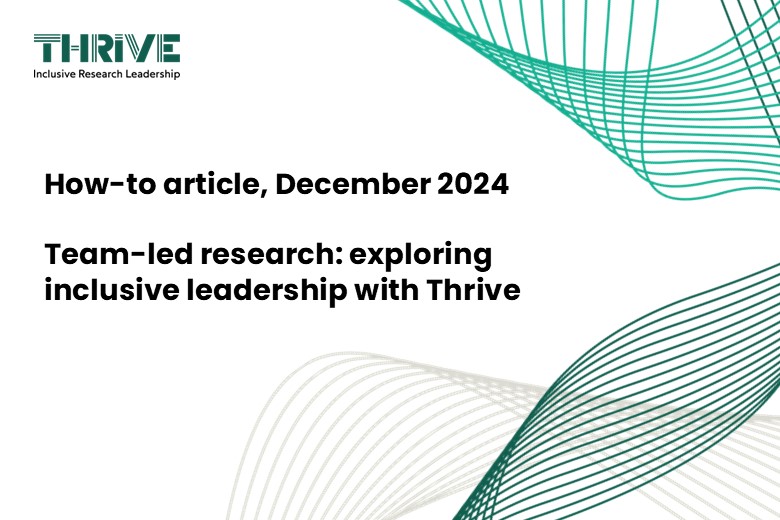Team-led research: Exploring inclusive leadership with Thrive
Posted on: 17 December 2024 in 2024

Research teams are increasingly exploring new approaches to leadership, moving beyond traditional Principal Investigator (PI)-centred models towards more inclusive, team-led structures. This shift aims to foster a collaborative, diverse, and innovative research culture.
The Thrive project, led by the University of Liverpool and funded by the Research England Development Fund, is contributing to this change by championing an approach to team convening that leverages the unique strengths and expertise of every team member.
In our 'How-to' series Alys Kay, Senior Researcher Developer, for the Thrive project will explore team-led research and offer insights, guidance, and practical tips to creating more inclusive environments.
In her first article, Alys shares some insights she gained from qualitative interviews conducted with academics and research professionals during the summer of 2024 for the Thrive project.
What does team-led research mean in the context of Thrive?
Thrive seeks to provide an alternative approach to the way research leadership is approached by focusing on inclusive, team-led practices that move beyond the limitations of traditional hierarchical models. At its core, team-led research acknowledges that leadership is not confined to one individual but is a shared responsibility that evolves based on the collective strengths of the team.
Inclusion in teams creates an environment where diverse perspectives lead to more inclusive decision-making.
A Principal Investigator reflected: "Diversity in teams and getting those conversations leads to more robust decision making. Very often, it has made a quantitative difference to how we do something because things we hadn't realised were raised, and we thought, that's true - we can make this better."
This shift underscores how acknowledging and valuing team diversity fosters innovation and improves outcomes.
Principles underpinning Thrive's approach to team-led research
Through extensive stakeholder engagement, the Thrive project has outlined five key principles to guide this alternative approach which we refer to as team-convening:
- Identify Appropriate Expertise: Recognise and utilise the unique skills each member brings to the table.
- Establish a Collective Leadership Structure: Distribute leadership roles so that decision-making is not monopolised but shared.
- Design Inclusive Governance: Develop frameworks that promote fairness and ensure all voices are considered in decision-making.
- Embed Development for All: Create opportunities for growth that extend beyond the traditional leadership pipeline.
- Engage in Reflexive Practice: Continuously evaluate practices to improve team dynamics and outcomes.
These principles help dismantle traditional barriers, allowing leadership to emerge organically within teams.
A project manager described how distributed leadership can effectively leverage team members' bandwidth: "The PIs don't have much time to dedicate because it's probably one of 10 large projects they're managing. The project manager actually has the bandwidth to think about who might be missing from the network and who they could reach out to."
Celebrating the alternative approach
By embedding these practices, the Thrive project aims to develop research teams that are not only more inclusive but also more resilient and innovative.
A research technician shared their perspective on respect within leadership: "I have a few different projects, which is what I like about it... My boss puts a lot of respect and ownership in research technicians, which is not always the case."
This respect and shared leadership contribute to a research culture where every member can thrive and feel valued.
The future of research leadership
Thrive's approach to team-led research is more than just a strategy; it's a movement towards a more collaborative, inclusive, and impactful research environment. By distributing leadership and fostering a culture that respects and builds upon the collective intelligence of all members, research teams can achieve greater success and innovation.
As one Principal Investigator reflected during a discussion about team science and its role in grant applications: "For me, team science is just good science. You can't do it without all the different disciplines working together. Leadership in this context isn't about controlling everything - it's about finding the right people, letting them lead where they're strongest, and ensuring everyone feels valued for their contributions."
Thrive is not only paving the way for this alternative model of leadership but also providing the tools, resources, and community needed to sustain it. Through this approach, research teams can achieve the project's core aim: fostering a positive, inclusive, and respectful research culture that values and shares the opportunities and responsibilities of leadership.
Practical tips for implementing team-led research
- Define leadership roles clearly: ensure everyone understands their leadership responsibilities to avoid confusion.
- Build a culture of psychological safety: encourage team members to share ideas and feedback without fear.
- Balance inclusivity with efficiency: while it's important to involve everyone, establish processes to keep decision-making timely.
- Create reflective spaces: use feedback sessions to identify what's working and what needs adjustment.
Self-coaching questions for research team leaders
- Are we leveraging the unique strengths of each team member effectively?
- How can we build a culture where all voices feel heard and valued?
- What steps can we take to align collective leadership with efficient project timelines?
During the interviews, Alys created an open, honest and transparent environment. To protect the anonymity of participants, job titles have been used in the article rather than names. These voices provide a rich understanding of the lived experiences and perspectives that shape team-led research practices and are invaluable to the success of the Thrive project.
The next article in the 'How-to' series - Leading without a Crown: What it takes in team-led research, will be out in January 2025.
Keywords: research, inclusive, leadership.